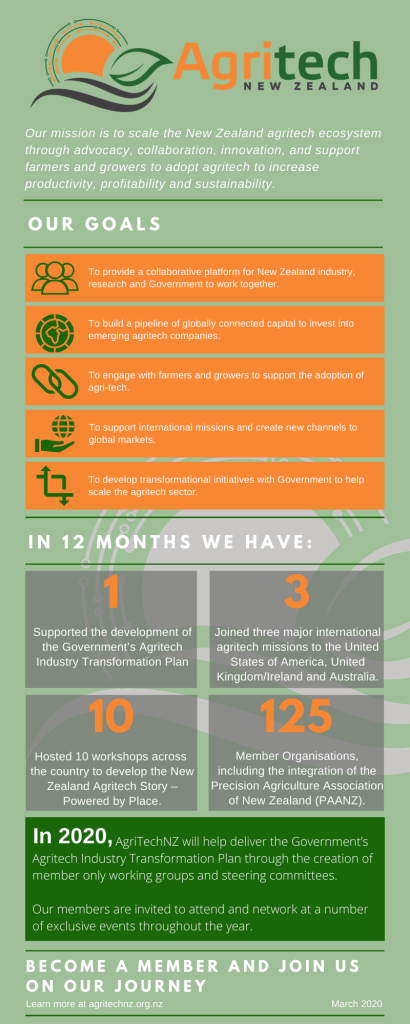Agritech New Zealand is delighted to announce its line-up of major international speakers for Agritech Unleashed – the one-day innovation event taking place during National Fieldays 2019.
Created in association with NZ National Fieldays Society and
generously sponsored by the Ministry of Primary Industries, Agritech Unleashed is
taking place in the Bledisloe Function Centre at Mystery Creek on Thursday 13
June.
The Agritech New Zealand Invitation Special!
On 23 May 2018, Agritech New Zealand was formally launched at the ’10 billion mouths’ conference in Tauranga. To celebrate our first anniversary today, we are offering readers of this post, the opportunity to apply for a free ticket to attend the Agritech Unleashed event.
This is an exceptional opportunity to hear from some of the
most influential players in the global agritech & agribusiness sector. There
are 5 key sessions during the event. To reserve your seat, please select your
chosen session here. If you have
not yet purchased your National Fieldays ticket, please do so here.
The Hon Damien O’Connor, Minister of Agriculture and Minister for Biosecurity, Food Safety, and Rural Communities will be speaking at Agritech Unleashed. The Minister will be joined by a number of other high-profile domestic speakers.
This post however is focusing on some of the major international
speakers and delegates who have travelled to New Zealand for the event.
Our international speakers
include;
Alexey Rostapshov: Head of Digital Innovation, John Deere
Based in San Francisco, as Head of Digital Innovation at John Deere, Alexey has been tasked with building the world’s leading digital platform for precision agriculture. Previously, as co-founder & COO at Mavrx, an aerial imagery & data analytics firm serving the agriculture industry, Alexey built a diverse team that designed and scaled the largest global imaging network dedicated to crop monitoring (covering 250 million acres using light aircraft & UAVs).
Arama Kukutai: Co-founder & Managing Director of Finistere Ventures
Arama is of Ngati Maniapoto, Tainui and Te Aupouri descent on his father’s side and spent his formative years in South Taranaki’s dairy sector. Today, based in San Diego, Arama co-founded Finistere Ventures and has led the creation of Finistere’s global network which includes offices in Tel Aviv, San Diego and Silicon Valley, and Dublin, Ireland. Finistere has invested in several New Zealand agritech companies including Biolumic, Zeakal, CropX and most recently Invert Robotics.
Richard O’Gorman: Director, Rabobank Food & Agriculture Innovation Fund
Based in the Netherlands, Richard joined Rabo Private Equity in 2010 and focuses on Rabobank’s international F&A venture capital and private equity activities. Richard serves on several Investment Committees and Advisory Boards for Rabobank’s portfolio of F&A funds and is closely involved in a range of Rabobank F&A innovation activities currently being carried out.
Michael Levin: Founder & Managing Director, Germin8
Based in Chicago, Michael founded Germin8 Ventures, which is a venture capital fund seeking to improve the global food system and is innovative in its own right, providing both investment and strategic resources to the exceptional founders of transformative food and agritech companies around the world. Michael oversees Germin8’s investing and operations, as well as actively participates on the boards of invested companies.
Sara Ahmed-Holman: Investment Analyst, Innovation Endeavor & Farm2050
Innovation Endeavors was founded in 2010 by Eric Schmidt and Dror Berman. Innovation Endeavor’s investment and portfolio support teams are located in three major regions of innovation: Silicon Valley, Tel Aviv, and New York City. Based in Palo Alto, Sara co-wrote the Farm2050 Nutrient white paper and will be keynoting this session at Agritech Unleashed.
Han Chen: CEO of Zeakal
ZeaKal, Inc. is a next generation trait technology company. Its focus is on increasing the photosynthetic capacity of plants — allowing crops to harvest more sunlight and carbon dioxide and translating it into more grains, seeds and fiber. Originally, much of the science came out of AgResearch in New Zealand. Today, based in San Diego, Han Chen has just signed a major global R&D partnership with Corteva Agriscience, the agriculture division of Dow DuPont.
Our international speakers are part of a larger delegation of international guests that Agritech New Zealand, in conjunction with New Zealand Trade & Enterprise, is hosting. It is providing New Zealand’s agritech sector with the opportunity to build deeper engagement opportunities with key global players.
We hope you can join us at the Bledisloe Function
Centre on Thursday 13 June.
